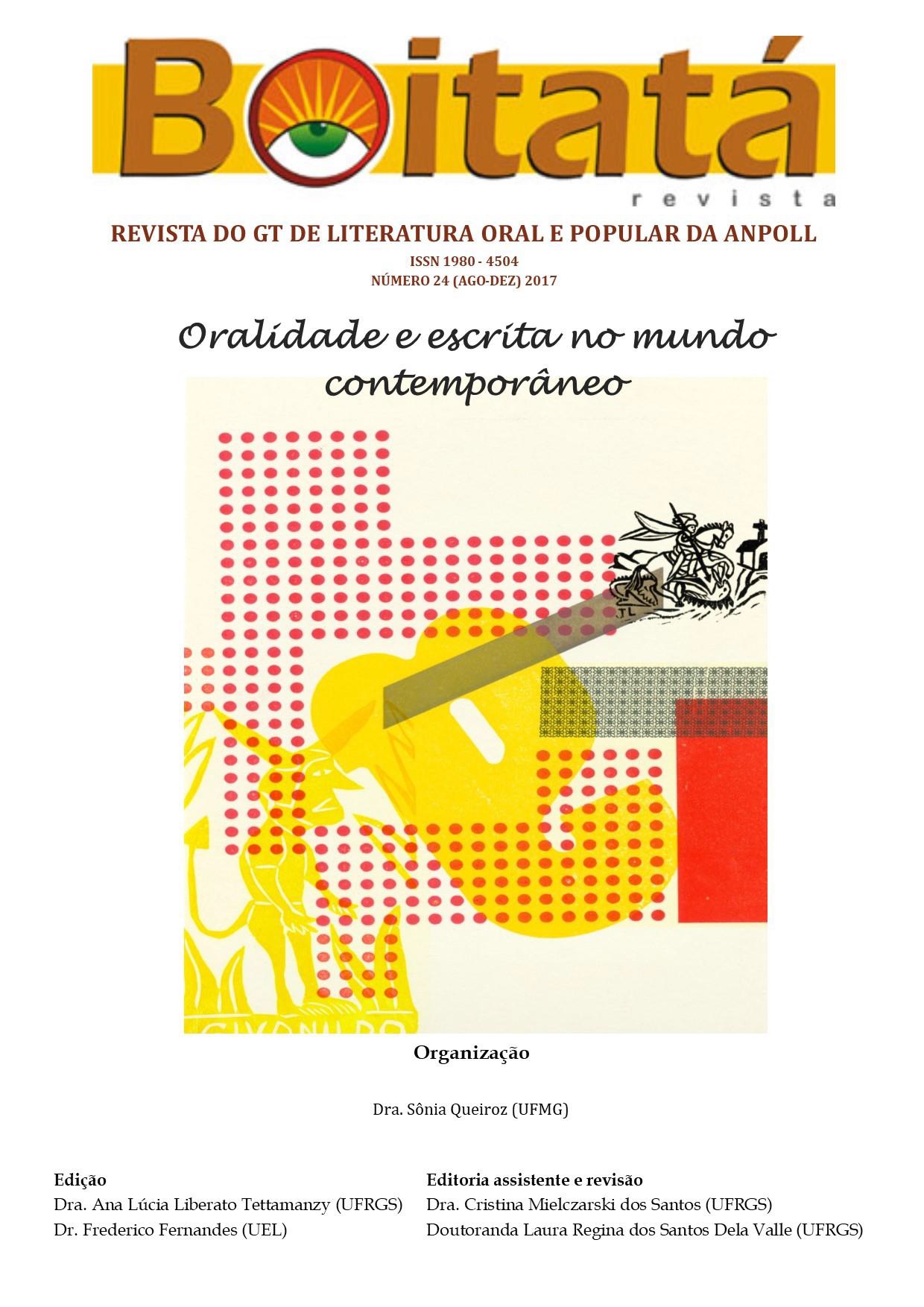Indio memories: a humanizing reading of daniel's indigenous literature Munduruku
DOI:
https://doi.org/10.5433/boitata.2017v12.e32959Keywords:
Indigenous literature, Humanization, Civilization.Abstract
This article intends to compose an analysis of the humanizing function of the indigenous literature having as specific object of work in Indian Memories: an almost autobiography of Daniel Munduruku. The Brazilian author and professor belong to the Munduruku people, who until the 19th century occupied the Tapajós Valley in a dominant way. his indigenous nation today struggles to stay in the region and preserve its warrior tradition. It aims to articulate considerations about the autobiographical and, at the same time, fictional character of the work and to elaborate a reflection on the role of indigenous literature in the social sphere and its relation with the concept of humanization proposed by Antonio Candido in some of his texts. It is tried to problematize the crystallized ordinary condition that this writing seems to occupy in comparison to literatures produced in the occidental context and to emphasize the relevance of the mentioned texts for the diffusion and knowledge of this pluriculture, merely denominated of indigenous culture.Downloads
Download data is not yet available.
References
CANDIDO, A. A literatura e a formação do homem. Revista Remate de Males: Antonio Candido. Campinas: DTL - Unicamp, 1999.
CANDIDO, A. Estímulos da criação literária. In: Literatura e sociedade. Rio de Janeiro: Ouro sobre Azul, 2006.
CANDIDO, A. Formação da literatura brasileira. São Paulo: Editora Martins, 1959.
CANDIDO, A. Literatura de dois gumes. In: A educação pela noite. Rio de Janeiro: Ouro sobre Azul, 2006.
CANDIDO, A. Literatura e subdesenvolvimento. In: A educação pela noite. Rio de Janeiro: Ouro sobre Azul, 2006.
CANDIDO, A. O direito à literatura. In: Vários escritos. Rio de Janeiro: Ouro sobre Azul, 2011.
CLASTRES, P. Do etnocídio. In: Arqueologia da violência: pesquisas de antropologia política. São Paulo: Cosac Naify, 2010.
LIBRANDI-ROCHA, M. A carta guarani kaiowá e o direito a uma literatura com terra e das gentes. Revista Estudos de literatura brasileira contemporânea. Brasília: UnB, n. 44, p.165-191, jul./dez. 2014.
MUNDURUKU, D. Memórias de índio: uma quase autobiografia. Porto Alegre: Edelbra, 2016.
RAMOS, A. Povo Munduruku, 2003. Disponível em: <https://pib.socioambiental.org/pt/povo/munduruku>.
CANDIDO, A. Estímulos da criação literária. In: Literatura e sociedade. Rio de Janeiro: Ouro sobre Azul, 2006.
CANDIDO, A. Formação da literatura brasileira. São Paulo: Editora Martins, 1959.
CANDIDO, A. Literatura de dois gumes. In: A educação pela noite. Rio de Janeiro: Ouro sobre Azul, 2006.
CANDIDO, A. Literatura e subdesenvolvimento. In: A educação pela noite. Rio de Janeiro: Ouro sobre Azul, 2006.
CANDIDO, A. O direito à literatura. In: Vários escritos. Rio de Janeiro: Ouro sobre Azul, 2011.
CLASTRES, P. Do etnocídio. In: Arqueologia da violência: pesquisas de antropologia política. São Paulo: Cosac Naify, 2010.
LIBRANDI-ROCHA, M. A carta guarani kaiowá e o direito a uma literatura com terra e das gentes. Revista Estudos de literatura brasileira contemporânea. Brasília: UnB, n. 44, p.165-191, jul./dez. 2014.
MUNDURUKU, D. Memórias de índio: uma quase autobiografia. Porto Alegre: Edelbra, 2016.
RAMOS, A. Povo Munduruku, 2003. Disponível em: <https://pib.socioambiental.org/pt/povo/munduruku>.
Downloads
Published
2017-12-27
How to Cite
CAMPOS, Nathally Regina M. N. Indio memories: a humanizing reading of daniel’s indigenous literature Munduruku. Boitatá, Londrina, v. 12, n. 24, p. 234–248, 2017. DOI: 10.5433/boitata.2017v12.e32959. Disponível em: https://ojs.uel.br/revistas/uel/index.php/boitata/article/view/32959. Acesso em: 10 feb. 2026.
Issue
Section
Seção Livre
License
Copyright (c) 2017 Boitatá

This work is licensed under a Creative Commons Attribution 4.0 International License.
Boitatá esta licenciada com CC BY sob essa licença é possível: Compartilhar - copiar e redistribuir o material em qualquer suporte ou formato. Adaptar - remixar, transformar, e criar a partir do material, atribuindo o devido crédito e prover um link para a licença e indicar se mudanças foram feitas.






















